- Home
- Carolyn Wells
The Vanishing of Betty Varian
The Vanishing of Betty Varian Read online
Produced by Mardi Desjardins, Stephen Hutcheson and theonline Distributed Proofreaders Canada team athttps://www.pgdpcanada.net
By CAROLYN WELLS
The Vanishing of Betty Varian The Luminous Face The Come Back In the Onyx Lobby The Man Who Fell Through the Earth The Room with the Tassels Faulkner's Folly The Bride of a Moment Doris of Dobbs' Ferry The Book of Humorous Verse Such Nonsense! _An Anthology_
NEW YORK GEORGE H. DORAN COMPANY
THE VANISHING OF BETTY VARIAN
BY CAROLYN WELLS _Author of "The Luminous Face," "The Come Back," "In the Onyx Lobby," "The Man Who Fell Through the Earth," etc._
NEW YORK GEORGE H. DORAN COMPANY
COPYRIGHT, 1922, BY GEORGE H. DORAN COMPANY PRINTED IN THE UNITED STATES OF AMERICA
CONTENTS
CHAPTER PAGE I Headland Harbor 9 II Betty Varian 24 III The Tragedy 39 IV The Search 54 V The Yellow Pillow 69 VI The Varian Pearls 84 VII Minna Varian 100 VIII Ransom 115 IX Poor Martha 130 X Pennington Wise 145 XI Clues 160 XII A Letter from Nowhere 175 XIII Where Is North? 190 XIV A Green Stain 205 XV Criminal or Victim? 220 XVI In Greenvale 236 XVII The Last Letter 250 XVIII The Trap 265
THE VANISHING OF BETTY VARIAN
CHAPTER I Headland Harbor
It is, of course, possible, perhaps even probable, that somewhere on thisgreen earth there may be finer golf links or a more attractive clubhousethan those at Headland Harbor, but never hope to wring such an admissionfrom any one of the summer colony who spend their mid-year at thatparticular portion of the Maine coast.
Far up above the York cliffs are more great crags and among the steepestand wildest of these localities, a few venturesome spirits saw fit topitch their tents.
Others joined them from time to time until now, the summer populationoccupied nearly a hundred cottages and bungalows and there was, moreover,a fair sized and fairly appointed inn.
Many of the regulars were artists, of one sort or another, but also camethe less talented in search of good fishing or merely good idling. Andthey found it, for the majority of the householders were people of brainsas well as talent and by some mysterious management the tone of thesocial side of things was kept pretty much as it should be.
Wealth counted for what it was worth, and no more. Genius counted in thesame way, and was never overrated. Good nature and an amusing personalitywere perhaps the best assets one could bring to the conservative littlecommunity, and most of the shining lights possessed those in abundance.
To many, the word harbor connotes a peaceful, serene bit of blue water,sheltered from rough winds and basking in the sunlight.
This is far from a description of Headland Harbor, whose rocky shores anddeep black waters were usually wind-swept and often storm-swept to a wildpicturesqueness beloved of the picture painters.
But there were some midsummer days, as now, one in late July, when theharbor waters lay serene and the sunlight dipped and danced on the tinywavelets that broke into spray over the nearby rocks.
Because it was about the hour of noon, the clubhouse verandah was crowdedwith members and guests waiting for the mail, which, as always, was late.
The clubhouse, a big, low building, with lots of shiny paint andweathering shingles, was at the nearest spot consistent with safety tothe shore. From it could be had a magnificent view of the great headlandthat named the place.
This gigantic cliff jutted out into the sea, and rising to a height ofthree hundred feet, the mighty crag showed a slight overhang whichrendered it unscalable. The wet black rock glistened in the sunlight, asspray from the dashing breakers broke half way up its sides.
The top was a long and narrow tableland, not much more than large enoughto accommodate the house that crowned the summit. There was a strip ofsparse lawn on either side the old mansion, and a futile attempt at agarden, but vegetation was mostly confined to the weird, one-sided pinetrees that waved the branches of their lee sides in mournful, eeriemotions.
"Can't see how any one wants to live up there in that God-forsakenshack," said John Clark, settling more comfortably in his porch rockerand lighting a fresh cigarette.
"Oh, I think it's great!" Mrs Blackwood disagreed with him. "Sopicturesque----"
"You know, if you say 'picturesque' up here, you'll be excommunicated.The thing is all right, but the word is taboo."
"All right, then, chromoesque."
"But it isn't that," Clark objected; "it's more like an old steelengraving----"
"Oh, not with all that color," said Lawrence North. "It is like anengraving on a gray, cloudy day,--but today, with the bright water andvivid sunshine, it's like a----"
"Speak it right out!" cried Ted Landon, irrepressibly, "like a picturepostcard!"
"It can't help being like that," Mrs Blackwood agreed, "for the postcardsfor sale in the office of the club are more like the reality than anypicture an artist has ever made of the Headland House."
"Of course, photographs are truer than drawings," North said, "and thatcard that shows the cliff in a storm comes pretty near being a work ofart."
"The difficulty would be," Clark observed, "to get any kind of a pictureof that place that wouldn't be a work of art. Why, the architect'sblueprints of that house would come a good deal nearer art than lots ofwatercolors I've seen in exhibitions. I'm keen on the place."
"Who isn't?" growled Landon, for most of the Headlanders resented thefaintest disparagement of their cherished masterpiece, a joint work ofnature and man.
The promontory was joined to the mainland by a mere narrow neck of rockyland, and from that point a rough road descended, over and between steephills, reaching at last the tiny village and scattered settlement ofHeadland Harbor.
Headland House itself was a modified type of old world architecture.Built of rough gray stone, equipped with a few towers and turrets,pierced by deep and narrow windows, it had some effects of a Frenchchateau and others that suggested an old English castle.
It was true to no school, it followed no definite type, yet perched onits lonely height, sharply outlined against the sky, its majestic rockfoundations sweeping away from beneath it, it showed the grandeur andsublimity of a well-planned monument.
And, partly because of their real admiration, partly because of a spiritof ownership, the artist colony loved and cherished their Headland Housewith a jealous sensitiveness to criticism.
"Stunning thing,--from here," John Clark said,
after a few moments offurther smoking and gazing; "all the same, as I stated, I shouldn't careto live up there."
"Too difficult of access," Claire Blackwood said, "but, otherwise allright."
Mrs Blackwood was a widow, young, attractive, and of a psychic turn ofmind. Not enough of an occultist to make her a bore, but possessing quickand sure intuitions and claiming some slight clairvoyant powers. Shedabbled in water colors, and did an occasional oil. She was long-limbed,with long fingers and long feet, and usually had a long scarf of somegauzy texture trailing about her. Of an evening or even on a dressyafternoon, she had a long panel or sash-end hanging below her shortskirt, and which was frequently trodden on by blundering, inattentivefeet.
Good-looking, of course, Claire Blackwood was,--she took care to bethat,--but her utmost care could not make her beautiful,--much to her ownchagrin. Her scarlet lips were too thin, and the angle of her jaw toohard. Yet she was handsome, and by virtue of her personality and herimplicit belief in her own importance, she was the leader socially,notwithstanding the fact that the colony disclaimed any society elementin its life.
"Tell us about the Headland House people, Claire. You've called, haven'tyou?"
This from Ted Landon, who by reason of his sheer impudence was forgivenany unconventionality. No other man at the Harbor would have dreamed ofaddressing Mrs Blackwood by her first name.
"Yes; I've called. They're delightful people." The words said more thanthe tone.
"With reservations?" asked North.
"Oh, in a way. They're quite all right,--it's only that they're notpicture mad,--as we all are."
"Ignorant?"
"Oh, no,--not that. Well, I'll sketch them for you. Mr Varian is a WallStreet man,----"
"Magnate?"
"Yes, I daresay. Wealthy, anyway. He's big and Vandyke-bearded. Wellmannered,--but a bit preoccupied,--if----"
"Yes, we get what you mean," said the irrepressible Ted. "Go on,--whatabout the daughter?"
"I haven't come to her yet. The mother is due first. Mrs Varian is theclingingest vine I ever saw. I only saw her on parade, of course, but I'mpositive that in curl-papers, she can whine and fret and fly into nervousspasms! Her husband spoils her,--he's far too good to her,----"
"What a lot you gathered at one interview," murmured Lawrence North.
"That's what I went for," Mrs Blackwood returned, coolly. "Well. MotherVarian is wrapped up in her blossom-child. Betty is a peach,--as I knowyou boys will agree,--but I never saw greater idolatry in any mother thanMrs Varian shows."
"Betty worth it?" asked John Clark, idly.
"Rather!" Mrs Blackwood assured him. "She's a dear thing. I don't oftenenthuse over young girls, but Betty Varian is unusual."
"As how?"
"Prettier than most girls, more charm, better manners, and,--a suspicionof brains. Not enough to hurt her, but enough to make it a pleasure totalk to her. Moreover, she's a wilful, spoiled, petted darling of twoworshipping parents, and it's greatly to her credit that she isn't anarrogant, impossible chit."
"Sounds good to me," commented Ted; "when can I meet her?"
"I'll introduce you soon. They want to meet some of our best people----"
"Of course. That lets me in at once. When will you take me?"
"Tomorrow afternoon. They're having a small picnic and they asked me tobring two amusing young men."
"May I go?" asked Lawrence North.
"_Young_ men, I said," and Mrs Blackwood looked at him calmly. "You areold enough to be Betty Varian's father!"
"Well, since I'm not, that needn't prevent my meeting her."
"So you shall, some time. But I'm to take two tomorrow, and,--what do youthink? I said I would bring Rodney Granniss, and Mr Varian said, 'No,he'd rather I asked some one in his place!'"
"Why, for heaven's sake?" cried Landon. "Rod's our star performer."
"Well, you see, they know him----"
"All the more reason----"
"Oh, it's this way. Rod Granniss is already a beau of Betty's,--and herfather doesn't approve of the acquaintance."
"Not approve of Granniss!" John Clark looked his amazement. "Mr Varianmust be an old fuss!"
"I think that's just what he is," assented Claire Blackwood, and then TedLandon urged,
"You haven't described the siren yet. What's she like to look at?"
"A little thing, sylphish, rather,--dainty ways, quick, alert motions,and with the biggest gray eyes you ever saw,--edged with black."
"Raving tresses?"
"No; very dark brown, I think. But the liveliest coloring.Red-under-brown cheeks, scarlet lips and----"
"I know,--teeth like pearls."
"No; good, sound, white teeth, and fluttering hands that emphasize andillustrate all she says."
"All right, she'll do," and Ted looked satisfied. "I can cut out old Johnhere, and if Granniss is barred, I'll have a cinch!"
"You must behave yourself,--at first, anyway, because I am responsiblefor you. Be ready to go up there with me at four tomorrow afternoon."
"Leave here at four?"
"Yes, we'll walk up. A bit of a climb, but motors can go only to thelodge, you know, and that's not worth while."
The porter's lodge belonging to Headland House was partly visible fromthe clubhouse, and it guarded the gates that gave ingress to the estate.There was no other mode of entrance, for a high wall ran completelyacross the narrow neck that joined the headland to the main shore, andall other sides of the precipitous cliff ran straight down to the sea.
From where they sat the group could discern the motor road as far as thelodge; and here and there above that could be glimpsed the narrow,tortuous path that led on to the house.
"Grim old pile," Landon said, looking at Headland House. "Any spookconnected with its history?"
"I never heard of any," said Mrs Blackwood. "Did you, Mr North?"
"Not definitely, but I've heard vague rumors of old legends or traditionsof dark deeds----"
"Oh, pshaw, I don't believe it!" and Mrs Blackwood shook her head at him."You're making that up to lend an added interest!"
North grinned. "I'm afraid I was," he admitted, "but if there isn't anylegend there surely ought to be. Let's make one up."
"No, I won't have it. I hate haunted houses, and I shan't allow a ghostto be invented. The place is too beautiful to have a foolish, hackneyedold ghost yarn attached to it. Just because you were up here last summerand this is the first year for most of us, you needn't think you can rulethe roost!"
"Very well," Lawrence North smiled good-naturedly, "have it your own way.But, truly, I heard rumors last year----"
"Keep them to yourself, then, and when you meet the Varians, as of courseyou will, don't say anything to them about such a thing."
"Your word is law," and North bowed, submissively. "Here comes the mailat last, and also, here comes Granniss,--the disapproved one!"
A tall outdoorsy-looking young man appeared, and throwing himself into apiazza swing, asked breezily, "Who's disapproving of me, now? Somebodywith absolute lack of fine perception!"
"Nobody here," began Landon, and then a warning glance from ClaireBlackwood prevented his further disclosures on the subject.
"Don't make a secret of it," went on Granniss, "own up now, who's beenknocking poor little me?"
"I," said Mrs Blackwood, coolly.
"Nixy, Madame Claire! You may disapprove of me, but you're not the one Imean. Who else?"
"Oh, let's tell him," North laughed; "he can stand the shock. They say,Granniss, you're _persona non grata_ up at the house on the headland."
Rodney Granniss' eyes darkened and he looked annoyed. But he only said,"That's a disapproval any one may obtain by the simple process ofadmiring Miss Varian."
"Really?" asked Claire Blackwood.
"Very really. To call twice is to incur the displeasure of one or bothparents; to venture a third time is to be crossed out of the guest bookentirely."
"But, look here, old man," Landon said, "th
ey've only been in that houseabout a week. Haven't you been rushing things?"
"I knew them before," said Granniss, simply. "I've met them in New York."
"Oh, well, then their dislike of you is evidently well-founded!"
But this impudence of Landon's brought forth no expression of resentmentfrom its victim. Granniss only winked at Ted, and proceeded to look overhis letters.
It was the first time in the memory of any of the present _habitues_ ofHeadland Harbor, that the house on the rocks had been occupied. Builtlong ago, it was so difficult of access and so high priced of rental thatno one had cared to live in it. But, suddenly, and for no known reason,this summer it had been rented, late, and now, toward the end of July,the new tenants were only fairly settled.
That their name was Varian was about all that was known of them, untilMrs Blackwood's call had been hospitably received and she brought backfavorable reports of the family.
It seems Betty was anxious to meet some young people and Mrs Varian wasglad to learn from her caller that small picnics were among the favoredmodes of entertainment, and she decided to begin that way.
Next day, she explained, a few house guests would arrive, and if MrsBlackwood would bring two or three young men and come herself, perhapsthat would be enough for a first attempt at sociability.
This met Mrs Blackwood's entire approval, and she proposed RodneyGranniss' name, all unsuspecting that he would not be welcomed.
"He's all right, you understand," Mrs Varian had said,--Betty not beingthen present,--"but he's too fond of my daughter. You can tell,--youknow,--and I want the child to have a good time, but I want her to have alot of young acquaintances, and be friendly with all, but not speciallyinterested in any one. Her father feels the same way,--in fact, he feelsmore strongly about it even than I do. So, this time, please leave MrGranniss out of it."
This was all plausible enough, and no real disparagement to Rodney, soMrs Blackwood agreed.
"Can I do anything for you?" she asked her hostess at parting. "Have youeverything you want? Are your servants satisfactory?"
"Not in every respect,"--Mrs Varian frowned. "But we're lucky to keepthem at all. Only by the most outrageous concessions, I assure you. Ifthey get too overbearing, I may have to let some of them go."
"Let me know, in that case, and I may be able to help you," and with afew further amenities, Claire Blackwood went away.
"But if I were one of her servants I shouldn't stay with her!" sheconfided later to a trusted friend. "I never saw a more foolishlyemotional woman. She almost wept when she told me about her cook'singratitude! As if any one looked for appreciation of favors in a cook!And when she talked about Betty, she bubbled over with such enthusiasmthat she was again moved to tears! It seems her first two little onesdied very young, and I think they've always feared they mightn't raiseBetty. Hence the spoiling process."
"And it also explains," observed the interested friend, "why the parentsdiscountenance the attentions of would-be swains."
"Of course,--but Betty is twenty, and that is surely old enough to beginto think about such things seriously."
"For the girl,--yes. And doubtless she does. But parents never realizethat their infants are growing up. It is not impossible that Rod Grannissand Miss Betty have progressed much further along the road to Arcady thanher elders may suspect. Why did the Varians come here,--where Rod is?"
"I don't suppose they knew it,--though, maybe Betty did. Young people arepretty sharp. And you know, Rod was here in June, then he went away andonly returned after the Varians arrived. Yes, there must have been somesort of collusion on the part of the youngsters."
"Maybe not. I daresay Miss Betty has lots of admirers as devoted as youngGranniss. Can't you ask me to the picnic?"
"Not this one. It's very small. And there are to be some guests at thehouse, I believe. The family interests me. They are types, I think. Bettyis more than an ordinary flutterbudget, like most of the very young girlsaround here. And the older Varians are really worth while. Mr Varian is abrooding, self-contained sort,--I feel sorry for him."
"There, there, that will do, Claire! When you feel sorry for a man--Iremember you began by being sorry for Lawrence North!"
"I'm sorry for him still. He's a big man,--in a way, a genius,--and yethe----"
"He gets nowhere! That's because he _isn't_ a genius! But he's a widower,so he's fair quarry. Don't go to feeling sorry for married men."
"Oh, there's no sentiment in my sympathy for Mr Varian. Only he intriguesme because of his restless air,--his restrained effect, as if he wereusing every effort to keep himself from breaking through!"
"Breaking through what?"
"I don't know! Through some barrier, some limit that he has fixed forhimself--I tell you I don't _know_ what it's all about. That's why I'minterested."
"Curious, you mean."
"Well, curious, then. And how he puts up with that hand-wringingready-to-cry wife! Yet, he's fawningly devoted to her! He anticipates herslightest wish,--he is worried sick if she is the least mite incommodedor disturbed,--and I know he'd lie down and let her walk on him if sheeven looked as if she'd care to!"
"What a lot you read into a man's natural consideration for his wife!"
"But it's there! I'm no fool,--I can read people,--you know that! I tellyou that man is under his wife's thumb for some reason far more potentthan his love for her, or her demand for affection from him."
"What _could_ be the explanation?"
"I don't know. That's why I'm curious. I'm going to find out, though, andthat without the Varians in the least suspecting my efforts. Wait tillyou see her. She's almost eerie, she's so emotional. Not noisy or evenverbally expressive, but her face is a study in nervous excitement. Sheseems to grab at the heartstrings of a mere passer-by, and play on themuntil she tears them out!"
"Good gracious, you make her out a vampire!"
"I think she is,--not a silly vamp, that the girls joke about,--but thereal thing!"

 The Deep Lake Mystery
The Deep Lake Mystery The Man Who Fell Through the Earth
The Man Who Fell Through the Earth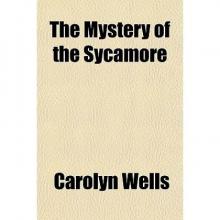 The Mystery of the Sycamore
The Mystery of the Sycamore The Mystery Girl
The Mystery Girl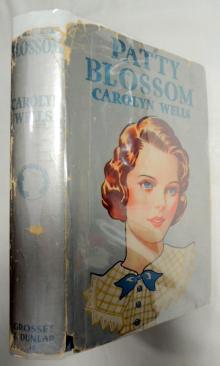 Patty Blossom
Patty Blossom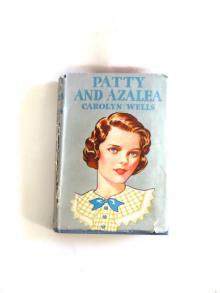 Patty and Azalea
Patty and Azalea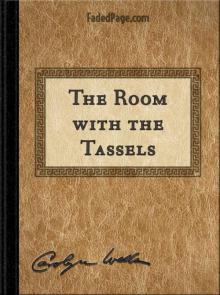 The Room with the Tassels
The Room with the Tassels The Vanishing of Betty Varian
The Vanishing of Betty Varian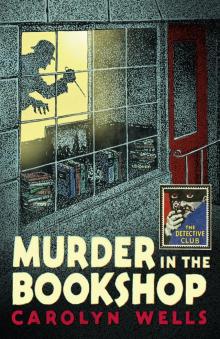 Murder in the Bookshop
Murder in the Bookshop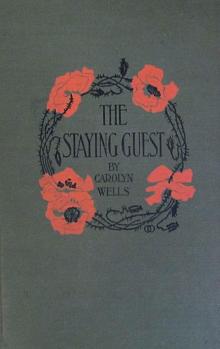 The Staying Guest
The Staying Guest The Curved Blades
The Curved Blades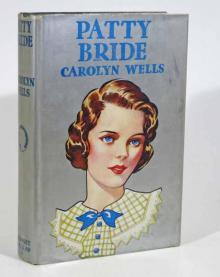 Patty—Bride
Patty—Bride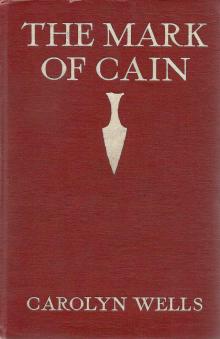 The Mark of Cain
The Mark of Cain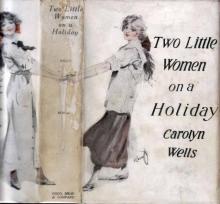 Two Little Women on a Holiday
Two Little Women on a Holiday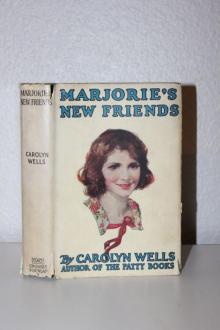 Marjorie's New Friend
Marjorie's New Friend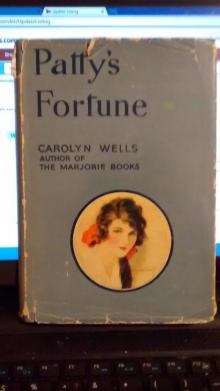 Patty's Fortune
Patty's Fortune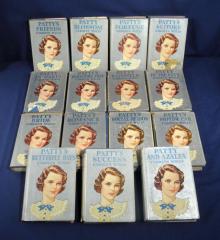 Patty's Social Season
Patty's Social Season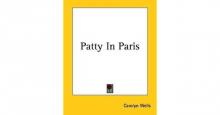 Patty in Paris
Patty in Paris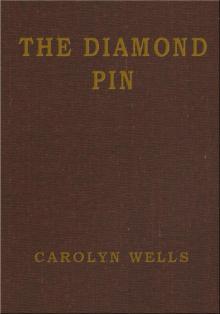 The Diamond Pin
The Diamond Pin The Come Back
The Come Back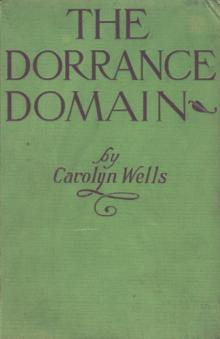 The Dorrance Domain
The Dorrance Domain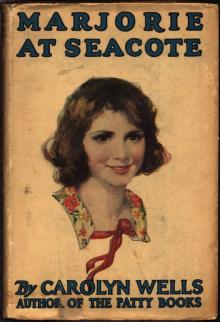 Marjorie at Seacote
Marjorie at Seacote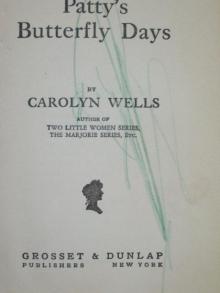 Patty's Butterfly Days
Patty's Butterfly Days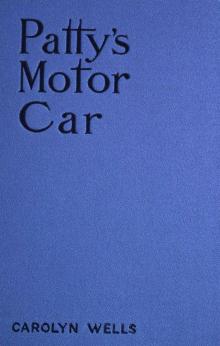 Patty's Motor Car
Patty's Motor Car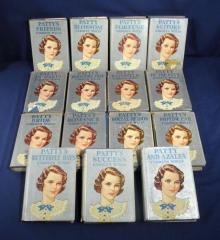 Patty's Success
Patty's Success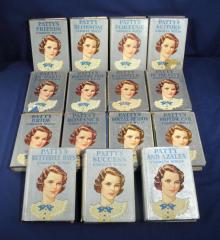 Patty's Suitors
Patty's Suitors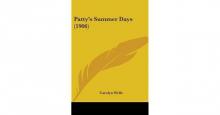 Patty's Summer Days
Patty's Summer Days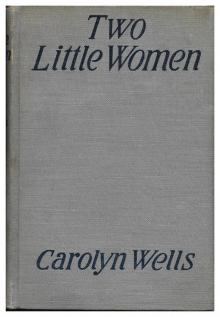 Two Little Women
Two Little Women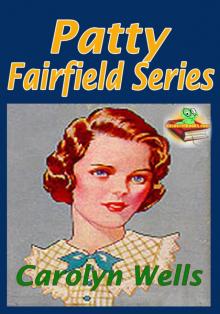 Patty Fairfield
Patty Fairfield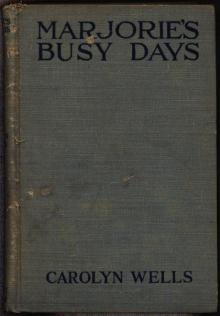 Marjorie's Busy Days
Marjorie's Busy Days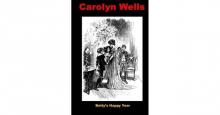 Betty's Happy Year
Betty's Happy Year In the Onyx Lobby
In the Onyx Lobby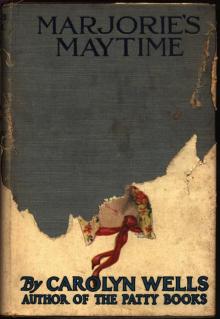 Marjorie's Maytime
Marjorie's Maytime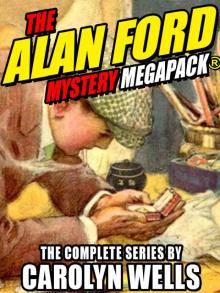 The Alan Ford Mystery MEGAPACK®
The Alan Ford Mystery MEGAPACK®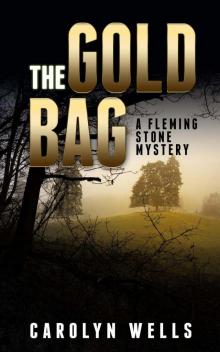 The Gold Bag
The Gold Bag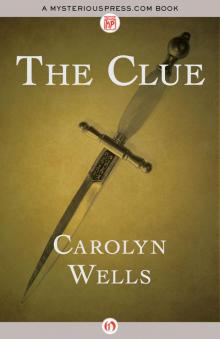 The Clue
The Clue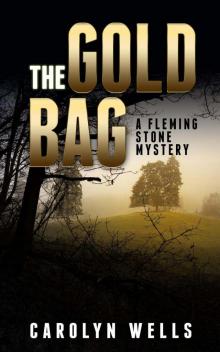 The Gold Bag : A Fleming Stone Mystery
The Gold Bag : A Fleming Stone Mystery